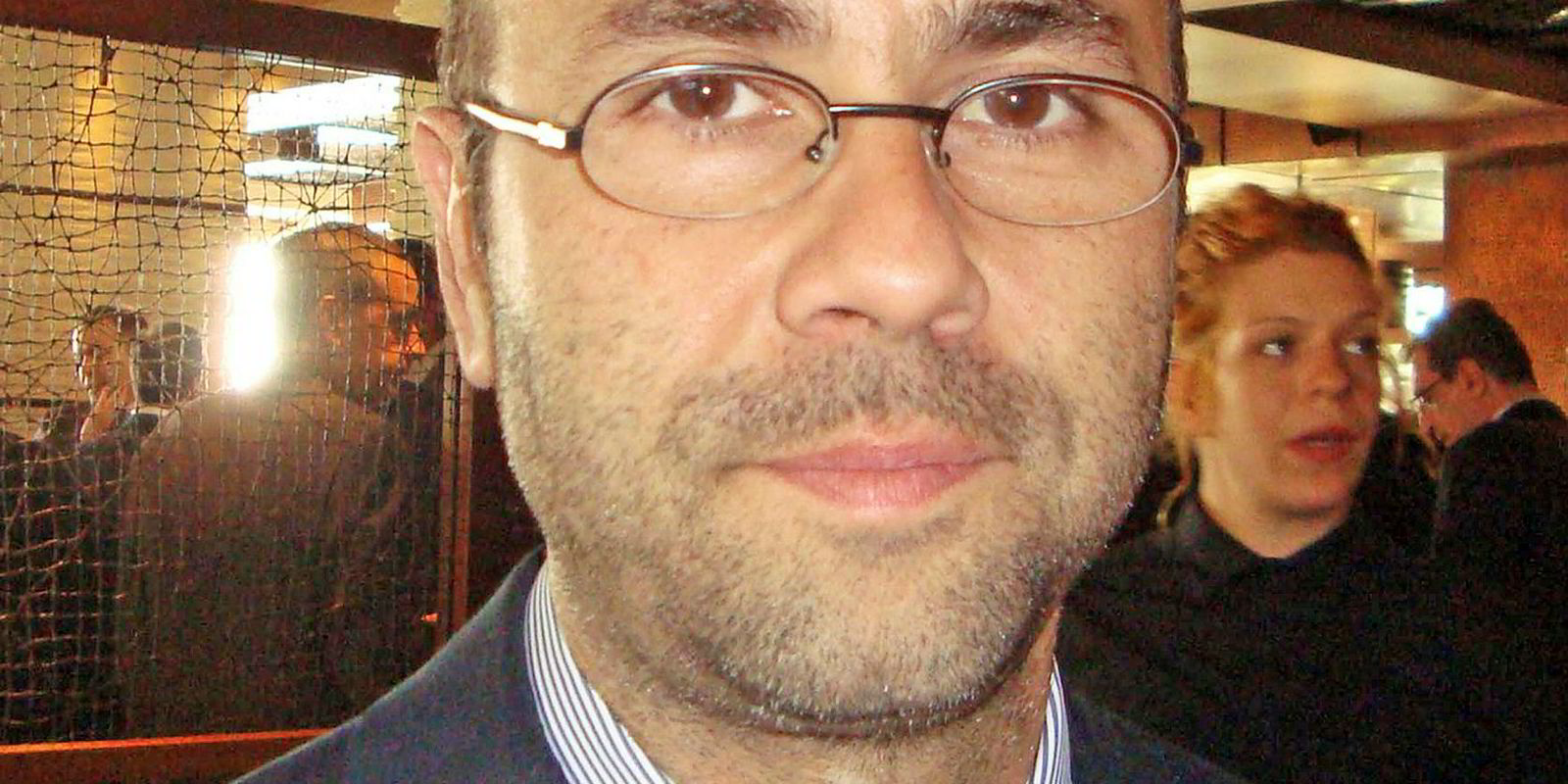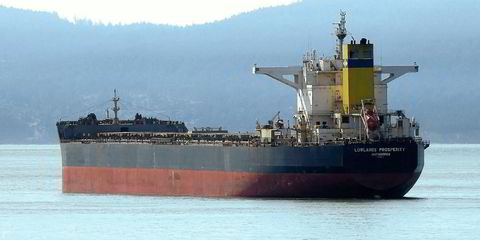If at first you succeed with a wager on dry bulk, maybe trying again is not always such a great idea.
That has been a hard lesson for New York-based private equity firm Kelso & Co, which last week sold the 11-vessel Delphin Shipping fleet to consolidator Star Bulk Carriers of Greece at what is being viewed as a deep discount to its market value.
Kelso struck gold the first time it teamed up with shipowner Sophocles Zoullas.
Striking gold
That investment led to the June 2005 initial public offering of Eagle Bulk Shipping, and what some estimate was a fivefold return by the time Kelso sold the last of its shares in January 2007.
It was Kelso and Zoullas again when Delphin formed in 2009, but to much less impressive results.
“There’s no question that lightning did not strike twice,” said one veteran finance man.
“This venture was never in the money — ever. Maybe they’re doing a little bit better [by] selling now than if they had two years ago, but not by much. They’re on the list of failed private equity investments.”
Kelso is just one of a raft of private equity firms whose money has been tied up in loss-making investments in dry bulk.
The way Star Bulk Carriers was able to pull off the deal using its own discount-priced stock could be a roadmap for other public companies to take advantage of the private equity firms’ plight, equity analysts and other finance sources suggest.
Petros Pappas-led Star Bulk used a blend of cash and shares to scoop the fleet for $139.5m — or a true price of $113.5m once the cost of installing gas exhaust scrubbers is backed out, according to Stifel equity analyst Ben Nolan.
The shares were trading at a mere 61% of Star Bulk’s net asset value (NAV), he estimated.
Companies trading at 61% of NAV are not supposed to be able to use shares to pull off buys of private vessels that are selling at NAV. The economics place the public company at a steep disadvantage.
This venture was never in the money — ever. They’re on the list of failed private equity investments
Finance veteran
Motivated seller
The exception comes when the seller is “motivated” enough to unload its ships at a similar NAV discount, which is what Kelso and Delphin did here, Nolan observed.
“Interestingly, we estimate the fair market value of the group of ships to be $176m,” he wrote. “This assumes the ships were built at a top-tier yard, which is not the case, but even shaving 10% off of the value of the fleet, we estimate Star Bulk acquired the ships at a 25% discount to fair value.”
Nolan put it more succinctly in a subheading within the same note: “Sweet deal.”
Not so much for Delphin and Kelso. But as Nolan observes, Kelso gets two things out of the deal: an $80m cash component that could satisfy the nearing maturities of the funds that entered the investment, and 4.5 million shares in Star Bulk with a potential upside should the shares take off in an improved market.
With the initial investment in 2009, Kelso was approaching the 10-year anniversary — usually an outside marker for a private equity fund.
Indeed, Zoullas highlighted the upside potential in a comment to TradeWinds this week.
'Future value'
“This is a good transaction for all stakeholders that allows Delphin shareholders to realise future value in an improving dry bulk market," he said.
"Delphin is not exiting dry bulk, but rather converting its interest into a leading public dry bulk company.”
Kelso did not reply to a request for comment prior to TradeWinds' deadline.
Its arrangement with Star Bulk is not unlike its position in the containership sector, where it is the largest holder in Global Ship Lease, which merged with Kelso’s long-time IPO hopeful Poseidon Container Holdings last year. However, its Star Bulk stake will be far smaller at 4.6%.
The shares-based upside is a strategy Star Bulk seems to have perfected in a series of buys — including deals with ER Capital Holding, Songa Bulk and Raffaele Zagari in 2018 — that have swelled its fleet to 120 vessels, the largest among public dry bulk owners.

That potential gain keeps Kelso from having to benchmark a loss on the entire investment. But at the same time, the strengthening of Star Bulk shares is not guaranteed, and indeed they could turn downward as easily.
The 11 Delphin vessels were all built at China’s Jiangsu Hantong Ship Heavy Industry between 2012 and 2014.
Star’s share price would have to rise higher than $13 for Kelso to be in the money. It’s interesting they were willing to do an NAV-to-NAV deal, but it’s a home run for Star
Public company officer
A 12th bulker, the 63,000-dwt ultramax Vela, was sold to Star Bulk last November for $20m in what appears to have been a prelude to the larger sale.
Delphin ordered the first seven bulkers of 57,000 dwt from Jiangsu Hantong in 2010 at an estimated price of $29m per vessel.
2005 IPO
The Delphin fleet hit a maximum value of $295m in May 2012, according to VesselsValue, and has mostly been in decline since the summer of 2014.
Whatever Kelso is able to recoup, there is no such ambiguity surrounding the success of Kelso’s original investment with Zoullas, who has had no connection with Eagle Bulk since his departure in 2015.
Eagle Bulk went public in June 2005 amid the unprecedented wave of dry bulk owners to tap US listings that year on the strength of a China growth story. It drew nearly $186m in proceeds, selling just over half of the company at $14 per share.
Kelso held 11.8 million shares before the offering and some 11 million just after it closed on 23 June. Existing holders entering the IPO had a cost basis of about $3 per share, according to SEC filings.
With the IPO proceeds, Eagle Bulk repaid $59.3m to Kelso for a loan bearing 7% interest that had been used for vessel acquisitions. It paid a further $1m fee to Kelso to terminate a financial advisory agreement.
Kelso then sold all of its shares over the next 18 months for between $14.50 and $16.93 per unit — thus the groundwork for a fivefold return on its $3 cost basis. Shares worth about $35m before the IPO likely were redeemed for about $190m.
Kelso also reaped substantial shareholder dividends as long as it held the stock.
Home run
Kelso will have some way to go to see that sort of return from Star Bulk. As Jefferies analyst Randy Giveans explained, the deal essentially valued Star Bulk’s shares at $13.21 each at a time when they were trading at $7.42.
“That means Star’s share price would have to rise higher than $13 for Kelso to be in the money. It’s interesting they were willing to do an NAV-to-NAV deal, but it’s a home run for Star,” one public company officer said.
“Kelso was obviously a motivated seller, but it would not have been easy for them to move that many ships so quickly in the sale-and-purchase market. Either way, they were looking at taking a pretty big haircut.”








